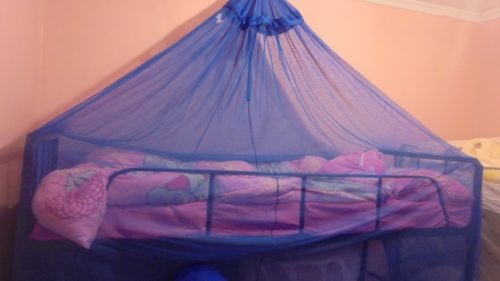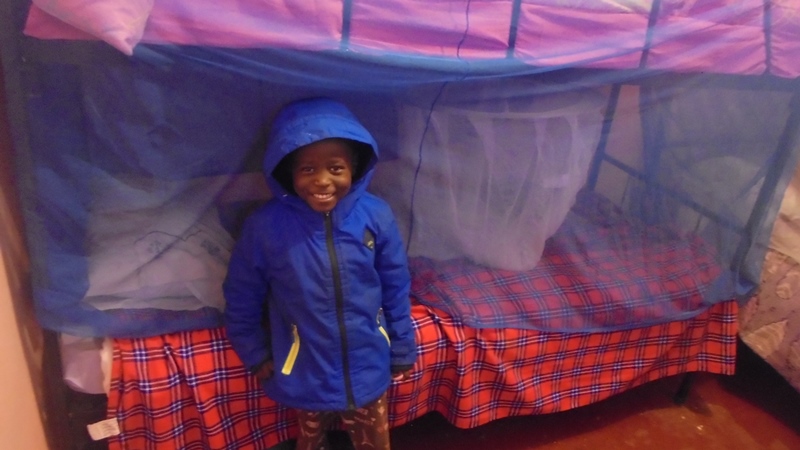In Kenya, children need mosquito nets to protect them from mosquito-borne illnesses so that they’ll be healthy enough to attend school. Each year, we purchase thousands of nets, thanks to donations to our Mosquito Net Fund, which we distribute to our sponsored children and their families.
A mosquito net offers protection against mosquitos and the diseases they may carry. Examples of mosquito-borne illnesses include malaria, dengue fever, yellow fever, Zika virus, and various forms of encephalitis (inflammation of the brain), including the West Nile virus (WNV). For the net to be effective, the mesh must be fine enough to exclude these insects without reducing visibility or airflow. It is also possible to further increase the effectiveness of a mosquito net greatly by treating it with an appropriate insecticide or mosquito repellant. Research has shown mosquito nets to be an extremely effective method of malaria prevention, having averted approximately 451 million cases of malaria between the years 2000 and 2015.
In Kenya, children need mosquito nets to protect them from mosquito-borne illnesses so that they’ll be healthy enough to attend school. Each year, we purchase thousands of nets, thanks to donations to our Mosquito Net Fund, which we distribute to our sponsored children and their families.
About mosquito-borne illnesses
– Malaria infects around 250 million people worldwide each year
-In 2015, malaria caused 438,000 deaths
– Worldwide incidents of dengue have risen 30-fold in the past 30 years – and more and more countries are reporting their first outbreaks of the disease
– The Zika virus, dengue fever, chikungunya, and yellow fever are all transmitted to humans by mosquitos
– More than half of the world’s population lives in areas where disease-carrying mosquitos are present
– The most effective means of preventing malaria is by sleeping under a mosquito net
About Kenya
Located in the African Great Lakes region of eastern Africa, Kenya is perhaps best known for its fertile highlands and grassy savannahs, teeming with an abundance of wildlife – and, of course, for its namesake peak, the glacier-laden Mount Kenya. Its economy relies heavily on agriculture and tourism. Kenya is also a cradle of civilization, rich in cultural heritage and diversity. The nation’s wealth of natural beauty, resources, and culture, however, belie the poverty in which most of its residents live. Tragically, destitution and weak government institutions allow for frequent human rights violations. Moreover, Kenya is plagued by a severe shortage of healthcare workers, which contributes to lower life expectancies, high infant mortality rates, and widespread preventable diseases.
Introducing St. John’s Community Center

A mosquito net offers protection against mosquitos and the diseases they may carry.
These maladies are, perhaps, most pronounced in Nairobi’s poorest and most dangerous neighborhood, Pumwani. Plagued by extreme poverty, disease, and crime, this area is home to thousands of needy children in desperate need of assistance. Many of these children live in slum conditions and suffer from malnutrition, abuse, and neglect. For these reasons, St. John’s Community Center serves as a safe place for our sponsored and unsponsored children to receive an education.
The center was established in the late 1950s following a violent period known as the Mau Mau Uprising. Its mission is to provide long-term social services to the needy – regardless of age, tribal affiliation, or faith. By providing for children’s immediate needs as well as investing in their future through education, St. John’s Community Center offers children the opportunity to break the cycle of poverty. Through sponsorship, we are able to support these children with basic needs, and with the additional support from our Mosquito Net Fund, we are able to provide them with mosquito nets to keep them healthy so that they can attend school.
***
HOW DO I CONTRIBUTE TO THE MOSQUITO NET FUND?
You can contribute to our Mosquito Net Fund in one of three ways: call our office at 1-800-538-5381 and speak with one of our staff members; email us at sponsorship@children-inc.org; or go online to our donation portal, create an account, and donate to our Mosquito Net Fund.
References:
https://www.unicef.org/supply/index_39977.html
https://www.againstmalaria.com/WhyNets.aspx
http://www.who.int/neglected_diseases/vector_ecology/mosquito-borne-diseases/en/
https://www.cdc.gov/niosh/topics/outdoor/mosquito-borne/default.html

